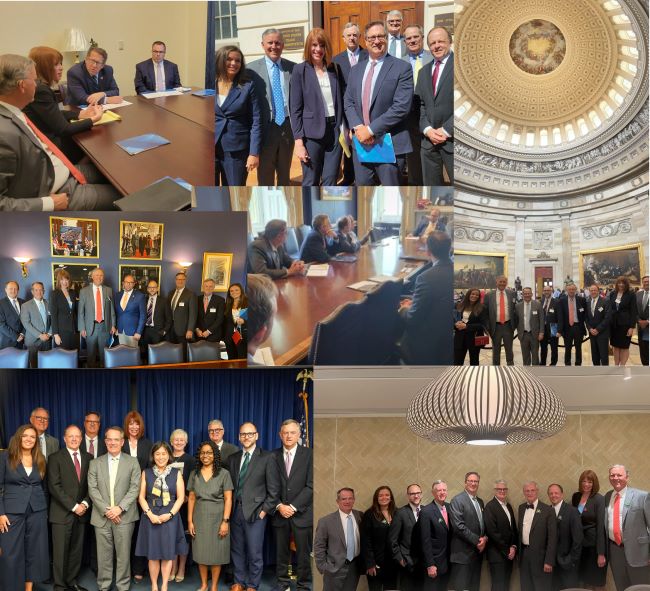NCTO Executive Fly-In Highlights Critical Trade Issues & Industry’s Competitiveness
NCTO executives participated in an important Washington fly-in last month, and met with some of the most powerful members of Congress and the nation’s top trade chief to discuss issues and policies critical to the NCTO membership.
The group of U.S. textile leaders who attended the high-level meetings included: NCTO Chairman Norman Chapman, who is President and CEO of Inman Mills; Parkdale Mills Chairman and CEO Andy Warlick; Unifi CEO Eddie Ingle; Barnet President and CEO Chuck Hall; Greenwood Mills President and CEO Jay Self; Palmetto Synthetics President David Poston; Milliken Director of Government Relations JP Tyson; and associate Katherine Heilig.
NCTO President and CEO Kim Glas and Todd Ethington, Director of Government Affairs, joined this distinguished group of textile leaders in leading substantive discussions on a wide range of policy issues, including fixing the de minimis loophole, strengthening China enforcement, maintaining the yarn-forward textile rule in CAFTA-DR and other trade agreements, and passing the Miscellaneous Tariff Bill (MTB).
The fly-in came at a pivotal time as congressional and federal regulatory scrutiny of Chinese imports entering the U.S. through the Section 321 de minimis trade loophole has intensified over the past couple of months, and calls to address and potentially change this little-known legal trade mechanism continue to gain momentum.
Executives met with some of the most influential members of Congress as well as the nation’s top trade chief, Ambassador Katherine Tai, who is the U.S. Trade Representative.
In the House, the China Select Committee has begun to form policy recommendations on issues like de minimis and forced labor, and in the Senate, leaders have signaled interest in crafting a China competition package this year.
Two bills have been introduced this year to combat de minimis abuse.
The first was introduced by Reps. Earl Blumenauer (D-OR) and Neal Dunn (R-FL) in the House, in conjunction with a companion bill in the Senate led by Sens. Sherrod Brown (D-OH) and Marco Rubio (R-FL) titled the u>Import Security and Fairness Act, which would effectively prohibit China and Russia from exploiting the Section 321 de minimis mechanism in U.S. trade law.
The second bill, introduced by Sens. Bill Cassidy (R-LA) and Tammy Baldwin (D-WI) is titled the De Minimis Reciprocity Act of 2023.
Two lawmakers, with whom executives met during the fly-in, have been at the forefront of hearings and probes into the business practices and models of e-commerce companies and brands that aggressively use the de minimis loophole.
Rep. Mike Gallagher (R-WI), Chairman of the House Select Committee on the Chinese Communist Party, said in hearings recently the “de minimis exception wasn’t supposed to be a loophole for foreign businesses looking to skirt human rights legislation and taxes. “It was meant to minimize the burden on customs agents actually. Shein and Temu have built empires using this loophole to underprice American competitors. American companies can’t be expected to compete against foreign firms who turn a blind eye to forced labor and dodge our import taxes.”
Rep. Raja Krishnamoorthi (D-IL), Ranking Member of the committee, has also weighed in, noting: “Temu and Shein are, as you know, some of the fastest-growing companies in the world. In particular, they use something called the de minimis exception, which means that for shipments valued at less than $800 they are able to ship directly from China to people’s homes and they are not subject to duties and there is much less information about their place of origin.”
And, House Ways and Means Chairman House Ways and Means Chairman Jason Smith (R-MO), who also met with the executives, has said it appears the loophole is “almost an $800 free trade agreement for China for products underneath that. It’s what it looks like to me.”
In addition to de minimis, the executives discussed China trade enforcement and other trade issues with Ambassador Tai, urged support for reauthorization of the Miscellaneous Trade Bill (MTB) and reiterated the importance of maintaining the yarn-forward rule of origin in free trade agreements, such as CAFTA-DR.
Rep. Blumenauer introduced a bill in June to reauthorize the MTB, TAA and GSP measures. The MTB is legislation that temporarily suspends or reduces import tariffs on manufacturing inputs that are unavailable domestically. Textile manufacturers benefit from duty breaks on inputs such as acrylic and rayon fibers and various chemicals that are not produced in the U.S. The MTB bill lapsed at the end of 2020 and Congress has thus far not advanced legislation to reauthorize it.
With momentum for these and related trade issues, it is vital for our industry to be active in the conversation and we sincerely thank each of the NCTO executives who took time out of their busy schedules to make the trip to Washington to highlight the industry’s manufacturing strength and importance to the U.S. economy.

